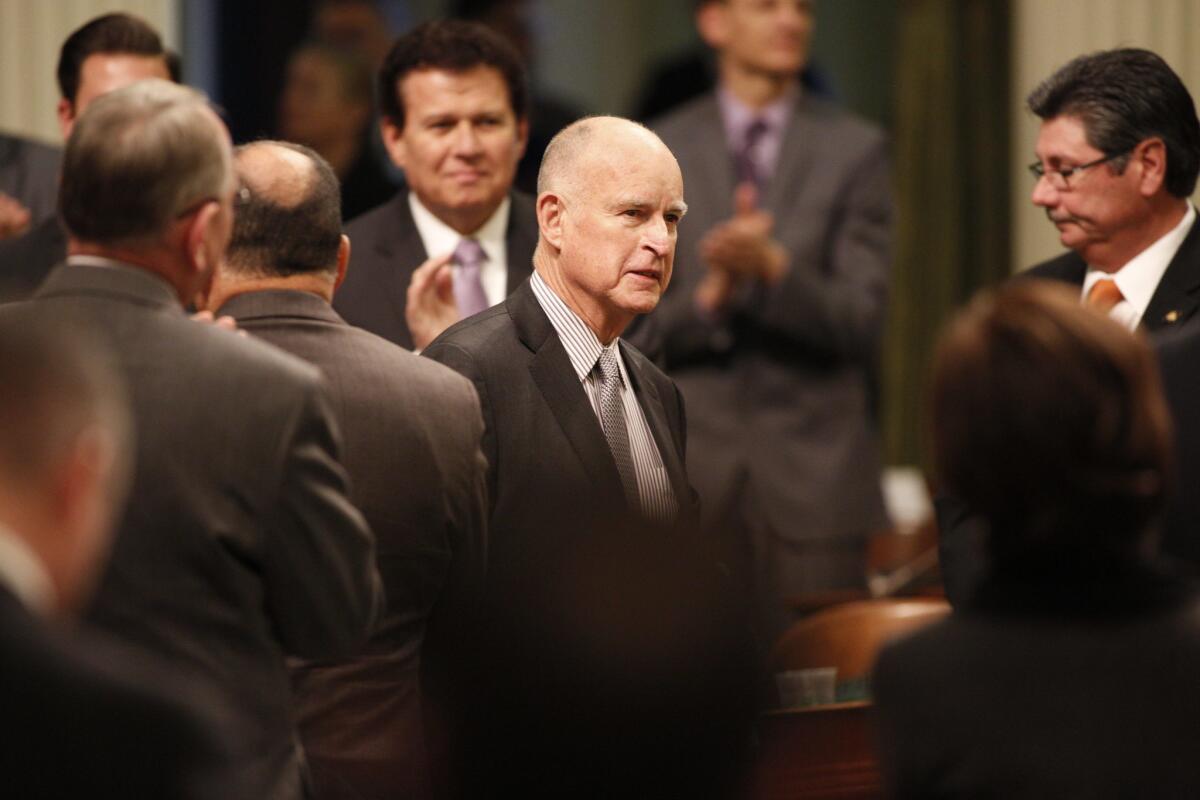Fate of Brown’s early parole initiative now rests with California Supreme Court

Gov. Jerry Brown at his State of the State address in January.
- Share via
Reporting from Sacramento — The fate of Gov. Jerry Brown’s plan to revamp decades of law governing prison sentences and juvenile justice now lies in the hands of the California Supreme Court.
The governor wants the state’s highest court to quickly reverse the ruling of a Sacramento judge that blocked his criminal justice ballot initiative from being cleared to collect voter signatures.
Judge Shellyane Chang ruled on Wednesday, in a case brought by the California District Attorneys Assn., that Atty. Gen. Kamala Harris should not have allowed Brown to submit his substantial revisions to an existing initiative without additional review.
See the most-read stories this hour >>
Brown formally filed his appeal Thursday, warning the justices that California’s long-term ability to comply with a federal court order to reduce its prison population hinged on voters being given a chance to approve his plan.
The initiative, said the governor in the filing, “would provide the state with a durable solution to prison overcrowding that enhances public safety and avoids the indiscriminate release of prisoners by federal court order.”
Brown unveiled his plan in late January, one highlighted by an overhaul of the rules regarding parole eligibility for inmates serving time for nonviolent crimes. Prisoners who earn enough good behavior credits or participate in education programs would be eligible for early release.
The governor’s plan was added to a proposed ballot initiative that already was being vetted -- one that originally dealt only with juvenile justice. The state district attorneys group then filed suit, claiming Brown was attempting to circumvent the normal review process for initiatives in order to more easily gather the roughly 585,000 valid signatures he needed to make the Nov. 8 statewide ballot.
If the state Supreme Court upholds the lower court ruling, the governor and his political team easily could miss the deadline for an initiative to qualify. Political consultants who specialize in ballot measures have said campaigns run a real risk if they don’t turn in voter signatures to elections officials by early May.
On Friday, attorneys representing Brown submitted a letter to the justices warning that even a ruling as soon as Tuesday could “likely make it impossible to qualify” the initiative for the fall ballot.
Brown is no stranger to the members of the state Supreme Court, having appointed three of the justices since returning to the governor’s office in 2011.
“If the superior court’s order stands,” his campaign attorneys wrote in their appeal, “the people will have been deprived of their right to use the initiative process to remedy problems that urgently require attention now.”
Follow @johnmyers on Twitter, sign up for our daily Essential Politics newsletter and listen to the weekly California Politics Podcast
ALSO
Lawsuits against Trump University claim students paid thousands for nothing
Republican voter registration tanks in California as fewer voters choose a party
Winning the party endorsement is ‘like trying to win an Iowa caucus’ ... but in California
More to Read
Get the L.A. Times Politics newsletter
Deeply reported insights into legislation, politics and policy from Sacramento, Washington and beyond. In your inbox three times per week.
You may occasionally receive promotional content from the Los Angeles Times.











